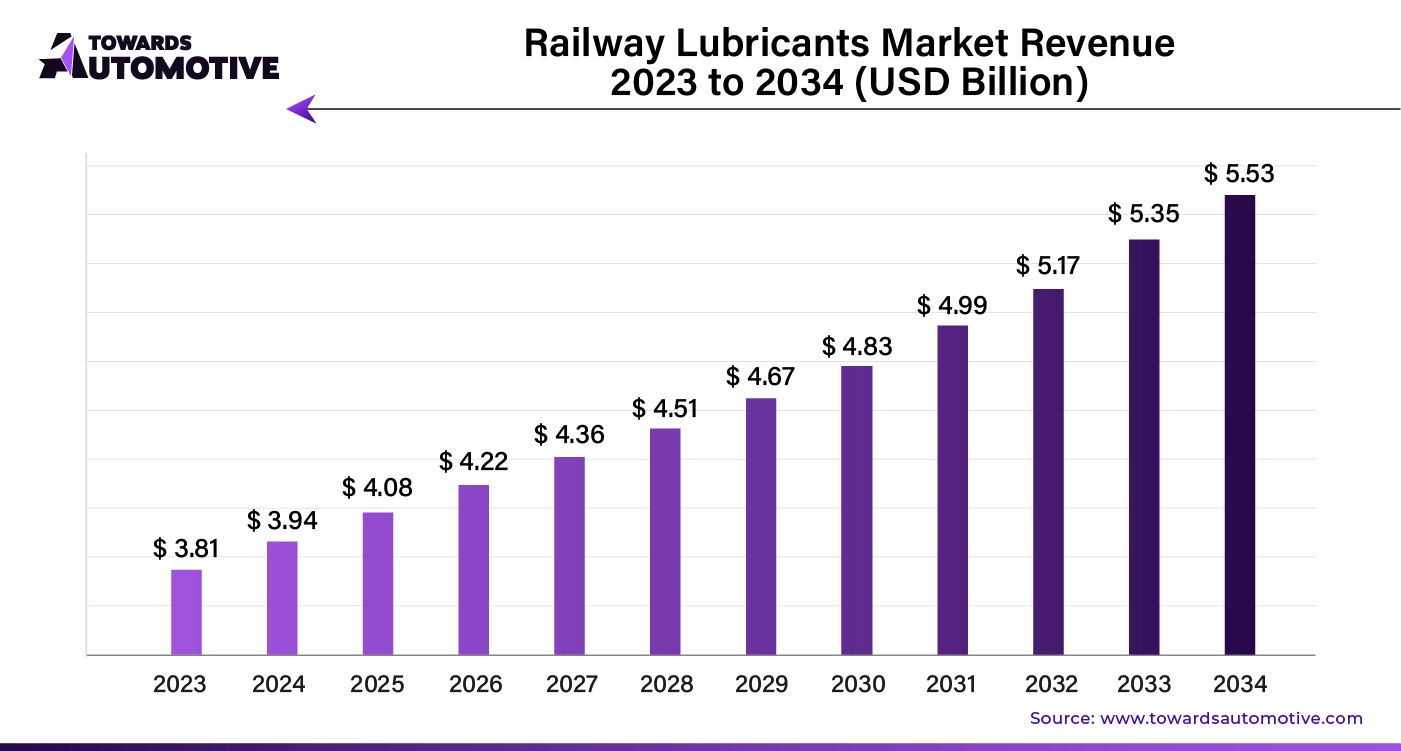The global railway lubricants market, valued at USD 3.81 billion in 2023, is estimated to grow to USD 5.53 billion by 2034, expanding at a compound annual growth rate (CAGR) of 3.45% between 2024 and 2034. This growth is driven by several key factors, including increasing investments in rail infrastructure, rising demand for freight transport, and the ongoing maintenance of aging railway assets. At the same time, challenges such as intense competition, regulatory complexities, and fluctuating raw material prices pose constraints. However, emerging opportunities in sustainable lubricants and smart technologies are expected to shape the future of the industry.

Get All the Details in Our Solution – Download Brochure @ https://www.towardsautomotive.com/download-brochure/1475
Drivers of Market Growth
Increasing Rail Infrastructure Investments
As urbanization continues to rise globally, the need for efficient transportation systems becomes paramount. Many countries, especially in developing regions, are focusing on expanding and upgrading their rail networks to meet the demands of urban growth and globalization. In particular, the Government of India has set an ambitious goal of allocating US$ 750 billion to rail infrastructure by 2030. This surge in investments has spurred the demand for reliable lubrication solutions that are essential for ensuring the safety, efficiency, and longevity of rail operations.
Rising Freight Transport Demand and Maintenance of Existing Assets
The growing global trade and logistics sectors have led to a surge in the demand for freight transport. This, in turn, is driving the use of lubricants in freight trains to ensure their optimal performance. Additionally, the aging infrastructure of many railway networks worldwide is prompting modernization and maintenance initiatives, further increasing the demand for lubricants. Railway operators are increasingly prioritizing energy-efficient and cost-effective solutions, which has led to the adoption of high-performance lubricants that offer enhanced operational efficiency and reduced maintenance costs.
Restraints in the Market
High Competition & Regulatory Challenges
One of the major challenges facing the railway lubricants market is intense competition, which often results in price wars among manufacturers. This price competition can erode profit margins and make it difficult for companies to maintain profitability. Moreover, the railway lubricants industry is subject to strict regulatory frameworks, particularly around environmental compliance. These regulations necessitate substantial investments in research and development to formulate lubricants that meet environmental standards. The ever-evolving regulatory landscape, particularly in regions with stringent environmental laws, further complicates the marketing and formulation of lubricants.
Volatile Raw Material Prices and Availability of Substitutes
The fluctuating prices of raw materials, such as base oils and additives, pose another challenge for the market. These price fluctuations can disrupt pricing strategies, making it difficult for manufacturers to maintain stable profit margins. Furthermore, there is growing competition from alternative lubrication technologies, such as self-lubricating components and solid lubricants, which could threaten traditional lubricant demand. Additionally, economic downturns can dampen investments in rail infrastructure, resulting in decreased demand for lubricants.
Opportunities in the Market
Demand for Sustainable Lubricants
The increasing emphasis on sustainability in various industries, including railways, has opened up significant opportunities for the railway lubricants market. There is growing demand for eco-friendly and biodegradable lubricants that align with the environmental goals of many railway operators and regulatory bodies. Manufacturers are responding to this demand by developing innovative formulations that minimize environmental impact while maintaining high performance. The shift towards greener lubricants presents a major growth opportunity for companies willing to invest in sustainable product development.
Adoption of Smart Technologies
In addition to the demand for sustainable lubricants, the increasing adoption of smart technologies in the railway sector is creating new opportunities for lubrication solutions. With the integration of condition-monitoring systems and predictive maintenance technologies, there is potential for optimizing lubricant usage and enhancing overall maintenance practices. By incorporating real-time data, railway operators can monitor the performance of lubricants and make timely adjustments to improve efficiency and reduce operational costs. This adoption of smart technologies is expected to revolutionize the lubrication landscape in the railway sector.
Recent Developments and Innovations
Several notable developments in the railway lubricants industry demonstrate the growing focus on sustainability and innovation. In April 2024, FUCHS launched its first sustainable engine oil, “TITAN GT1 PRO 2010 SAE 0W-20,” which is approved according to the PSA B71 2010 specification. This product is widely used in the Stellantis vehicle portfolio, highlighting the company’s commitment to environmentally friendly solutions. Additionally, FUCHS signed an agreement to acquire the international LUBCON Group, aiming to develop advanced high-quality specialty lubrication solutions. These moves are indicative of the increasing emphasis on innovation and sustainability within the industry.
Similarly, Shell Deutschland GmbH made a significant investment decision in January 2024, committing to convert the hydrocracker of the Wesseling site at the Energy and Chemicals Park Rheinland into a production unit for Group III base oils, which are crucial for high-quality lubricants. Furthermore, in October 2022, Kluber Lubrication introduced a new, fully synthetic wheel bearing grease designed for the railway industry, showcasing the ongoing efforts to enhance lubrication technology.
Invest in Our Premium Strategic Solution @ https://www.towardsautomotive.com/price/1475
You can place an order or ask any questions, please feel free to contact us at sales@towardsautomotive.com
Explore the comprehensive statistics and insights on automotive industry data and its associated segmentation: Get a Subscription
For Latest Update Follow Us: https://www.linkedin.com/company/towards-automotive
